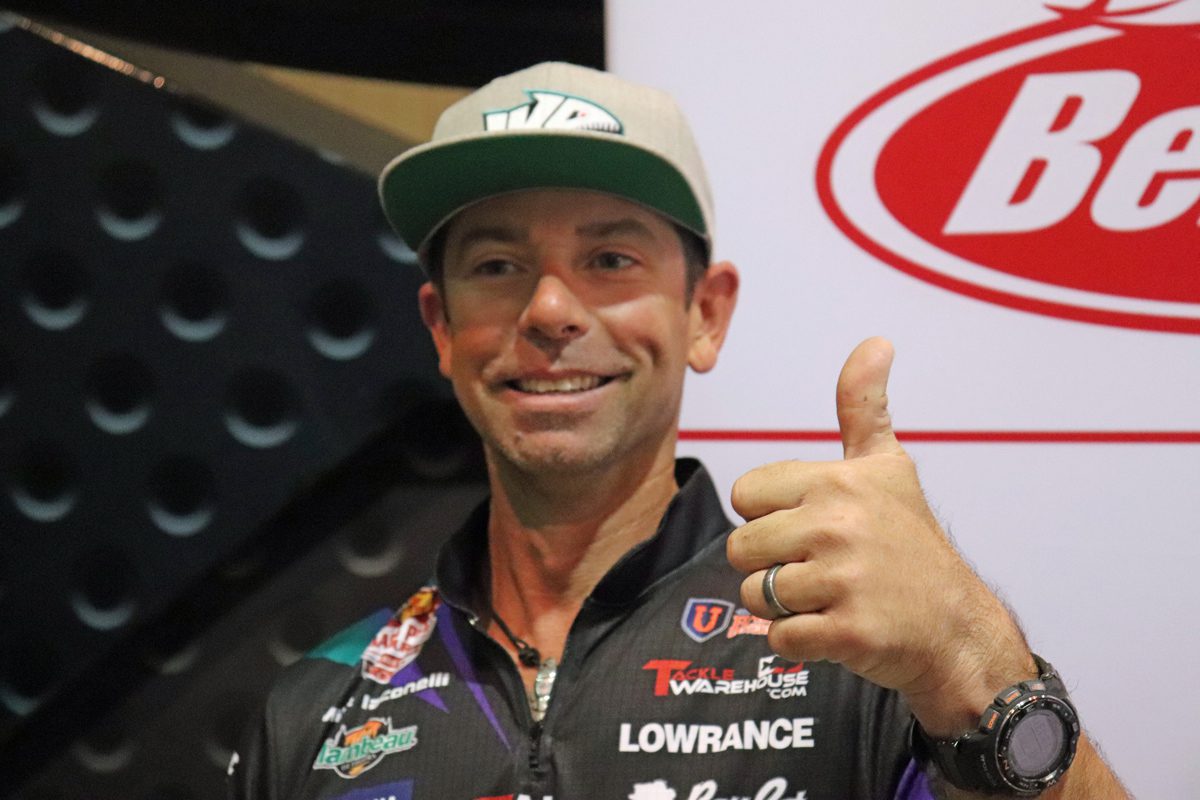How Mike Iaconelli Boats Bass With The Chicken Rig
[print_link]
One of the most appealing aspects of bass fishing is the diverse list of ways that largemouth, smallmouth, and spotted bass can be caught. It seems as if every year, crafty anglers discover new and exciting ways to boat bass at a feverish pace. Such discoveries place additional tools at our disposal for putting bass in the livewell, and afford us the opportunity to be more efficient anglers in general.
One such tactic, that continues to find favor among an ever-growing number of bass fishermen, is that of fishing the Chicken Rig. Although this rig is utilized by a number of anglers, under a wide array of circumstances, few have been as outspoken regarding its benefits as 2003 Bassmaster Classic Champion and 2006 B.A.S.S. Angler of the Year, Mike Iaconelli.
Why The Chicken Rig?
Iaconelli touts the rig as being universal in its ability to put bass in the boat, no matter the body of water or lake conditions. He says, “I use it all year round. I would say spring through fall it’s at its best. It can be used in any cover, from no cover to the heaviest, gnarliest cover you can imagine.”
According to Iaconelli, the Chicken Rig owes much of its value to the versatile role that it can play in an angler’s fishing repertoire. “The Chicken Rig is basically a weedless Neko Rig. It is a Neko Rig that you rig Texas-Style, and it gives you the same pecking action as a Neko Rig, but you can fish it anywhere,” says Iaconelli. “You can use it when fishing in heavy cover or sparse cover, when skipping under docks, and when fishing shallow or deep,” he continues.

What Bait Should You Be Fishing?
Though several baits can be fished in conjunction with the Chicken Rig, one, in particular, has yielded excellent results for Iaconelli. “I’m using the Berkley Powerbait Flute Worm. You can use all three sizes, but the 5.7” is the most versatile,” Iaconelli says.
When it comes to color choices, Iaconelli says that what he uses varies depending upon the situation, and though he tries to match the color of his bait to corresponding hatches, it is also extremely important to choose what will catch the eye of bass that reside in a given body of water.
What Does The Chicken Rig Consist Of?
Iaconelli says that rigging the Chicken Rig is no more difficult than rigging any other soft plastic set-up, and shares similar components to other popular finesse rigs. “I like using a size 1 to 1/0 or 2/0 straight shank style hook. A VMC Finesse Neko Hook is the right hook,” says Iaconelli.
Choosing which weight to use when fishing the Chicken Rig is also fairly straightforward according to Iaconelli. His head of choice is a VMC Half Moon Wacky Weight. “The nail weight is just a little nail. I’ll use anywhere from a 1/16 ounce to a ¼ ounce weight,” says Iaconelli.
When fishing the Chicken Rig, the devil is in the details. From which end of your soft plastic that the weight is to be placed, to where your hook intersects the body of your bait, a keen attentiveness to the fine details are what makes the Chicken Rig so effective.
Iaconelli stresses the importance of weight placement by saying, “I put it in the fat end of that Flute Worm. It’s really important.” Iaconelli continues, “You want that skinny end to be up shaking, you want the fat end to have the nail, and as you shake your rod, that nail pecks the bottom.”
Referring to hook placement, Iaconelli explains that though the Chicken Rig is hooked Texas-Style, it is not at the nose of the bait as many are used to. “I’m rigging it Texas-Style back in the body of the bait, and that’s the key. I rig it just below the halfway point of the bait. On the Flute Worm, we have three high spots. So I start in the middle-high spot, and by the time the hook pops out at the bottom, it’s at the bottom-high spot,” says Iaconelli.
The Texas-Style hook placement that is used in conjunction with the chicken rig comes as one of the major differences between it and the Neko Rig. Because the hook features no exposed point, the chicken rig can be fished virtually anywhere without fear of snagging. This comes as a significant advantage when fishing among heavy brush and in dense vegetation.
When striving to achieve the best results possible while fishing the Chicken Rig, your choice of line also plays a vital role. “I prefer Berkley X5 braided line tied to an 8-10 pound Berkley Trilene fluorocarbon leader,” says Iaconelli. As with most any form of finesse fishing, Iaconelli finds favor in the use of spinning tackle, which allows him to optimize his presentation and put bass in the boat.
Chicken Rigging To Success
The Chicken Rig offers anglers a number of distinct advantages, with the biggest being that it is fished in a completely weedless fashion. As a modified version of the Neko Rig, the Chicken Rig can be fished without any reluctance toward the snags and hang-ups that lie below. This allows you to pull bass from locations that those fishing the Neko Rig would seldom dare to venture. Next time the bass at your local lake refuse to give any ground, tie on a Chicken Rigged soft plastic, and make the most of your time on the water.


